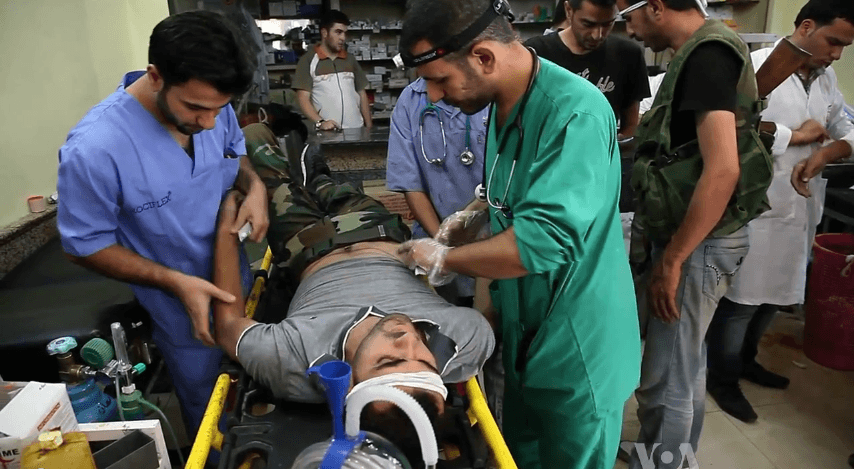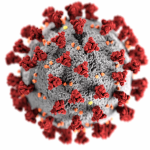A form of biological warfare in Syria and Yemen
By Elisabeth Eaves | November 6, 2018
 Medical staff treat injured rebel fighters and civilians in Aleppo, Syria, in October 2012. (Photo credit: Voice of America.)
Medical staff treat injured rebel fighters and civilians in Aleppo, Syria, in October 2012. (Photo credit: Voice of America.)
Biological warfare has a long history, going back to when the Assyrians poisoned enemy water sources more than two millennia ago. But biological warfare, as commonly understood, has always involved introducing some sort of pathogen—ancient poisons, diseased corpses, plague-infested fleas, anthrax—into a population. In a story for Foreign Policy, the doctor and global public health expert Annie Sparrow advances a more unusual argument: That Syria’s embattled dictator Bashar Al-Assad, by deliberately degrading healthcare to encourage disease and death, is also conducting a form of biological warfare.
Disease has always been associated with war, but historically wartime outbreaks afflicted mostly soldiers, who were jammed together in trenches or stuck in unsanitary hospital wards. Today, though, Assad is encouraging disease among civilians, not soldiers, and doing so by simply depriving them of modern medicine. As it turns out, it’s an easier way to kill people than weaponizing pathogens, which can be tricky and hard to control.
Sparrow makes a compelling case. Assad’s forces have bombed hospitals, clinics, labs, and blood banks. They “went after doctors, criminalizing those who treated civilians and arresting, torturing, and executing any health care worker who defied government policy.” Assad withheld polio vaccinations from a region seen as non-loyal. His forces blocked humanitarian convoys from delivering surgical tools, sterile gloves, antibiotics, pneumonia kits, and splints. It adds up to “an intentional cultivation of disease in opposition-held areas,” Sparrow writes. Polio, eliminated from Syria in 1995, reappeared in 2013.
Sparrow does not mention Yemen in her story, but it is impossible to read her piece and not think of that country some 1,300 miles south of Syria. There, too, a war is raging, and there, too, civilians are suffering. Not just from bombs—like the one a Saudi jet dropped on a bus full of school children on August 9, killing 54 of the 10,000-plus civilians slain in the conflict so far—but from effects on their health. About 14 million Yemenis are facing starvation, and the world’s worst modern outbreak of cholera is underway, as Robert F. Worth writes in the New York Times. This promotion of sickness appears deliberate: The Saudi-led coalition battling the Houthis, who are the de facto rulers of most of the population, has blockaded the country so that shipments of food and medical supplies are frequently barred or delayed. “The combined effect of the war and these artificial shortages is visible at hospitals all over the country,” Worth writes, describing wards full of skeletal people in a province where most “health clinics have been demolished by bombs.” Acute child malnutrition—the kind that leads to stunting—is now more common than not in some regions. There has been a mysterious apparent increase in birth deformities and child cancer. Insulin is running out.
Like Syria’s Assad, Saudi Arabia’s Prince Mohammed bin Salman, architect of his country’s war in Yemen, may perceive a short-term strategic gain in deliberately sickening civilians. But both despots deploy this alternative form of biological warfare at their peril—at everybody’s peril, really. Viruses and bacteria like to breed in certain conditions, but ultimately they don’t care about borders. As Sparrow writes, “the next pandemic is more likely to be a superbug emanating from a devastated war zone than a deadly virus spawned in a laboratory.” And disease doesn’t wait to have its papers checked.
Publication Name: Foreign Policy
To read what we're reading, click here
Together, we make the world safer.
The Bulletin elevates expert voices above the noise. But as an independent nonprofit organization, our operations depend on the support of readers like you. Help us continue to deliver quality journalism that holds leaders accountable. Your support of our work at any level is important. In return, we promise our coverage will be understandable, influential, vigilant, solution-oriented, and fair-minded. Together we can make a difference.
Topics: Biosecurity, What We’re Reading














